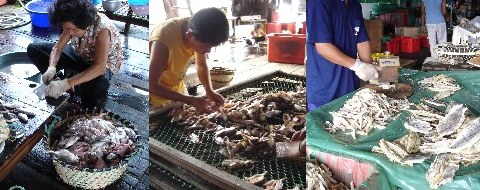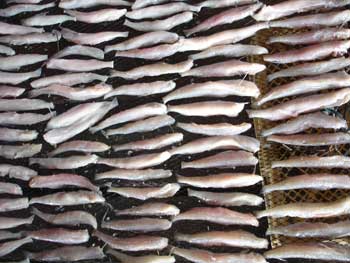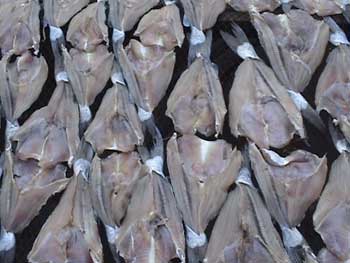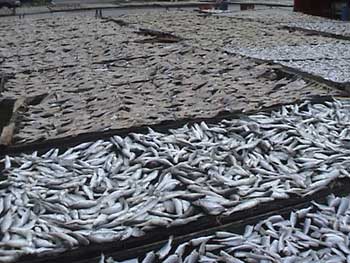
|
||
|
Follow @Nazlina
Salted fish (Ikan Masin)Salted fish or ikan masin is one of the oldest ways to preserve fresh fish in order to prevent them from decaying. Before refrigeration technique was invented, fish and other seafood were cured in salt or salt water (brine).
Other than preserving the fish with brine, dried fish is also very popular. The fish are gutted, sprinkled heavily with coarse sea salt and then left to dry on the beach in the hot sun for several days. The result is desiccated fish, free of moisture, which can be kept for months to be made later into many kinds of food. Many kinds of fish are salted. Common ones include stingray, gelama, talang, king mackerel, kurau and jack. (I will try to find the English equivalent names for them later).
I went fishing once in the open sea. My simple fishing line, just a piece of string with many hooks attached to it, hit a school of ikan gelama. Wow, it was so exciting! Even though they are not that big, the flesh is very sweet if deep fried with fresh turmeric. Mmm, mmm, mmm! Ikan gelama has thick scale, so most of the time, they are cooked without descaling. Simply gut them, coat with a bit of salt and turmeric and deep fry them. The crispy scales are then good to eat. Or gut, salt and dry them. Tedious steps to make salted fish:
Ironically, at famous seafood produce location like Pulau Pangkor, locally made dried and salted sea products are more expensive because no additives are added. Cheaper ones are those salted fish or dried squid imported from Thailand as they are preserved with chemicals to make them last longer.
For ikan bilis (related to anchovies) and shrimps, as soon as they are harvested, the fish and shrimps are first boiled in sea water on the boat. Then when the fishing boat arrives on the shore, the fish and shrimps are dried on trays. They are then hand-sorted according to size and also type. No wonder ikan bilis and dried shrimps are expensive. Ikan bilis are sorted through size and colors. Generally, the smaller and lighter colored the ikan bilis are, the more costly they are.
Cuttlefish, jellyfish, mussels, octopus and scallop are also dried. The methods use vary a little because sometimes other preservatives are used (like soda). Therefore, extra care must be taken when cleaning the produce before cooking, to get rid of the alkali. Some people can get stomach upset if the chemicals are not washed off properly. Other traditional treatment to preserve fish includes fermenting river or pond fish in rice and tamarind (ikan pekasam), fermenting anchovies and cuttlefish resulting in budu (fish sauce popular in Terengganu and Kelantan) and the more common Thai fish sauce. There is a type of mini shrimps preserved in brine (cencaluk - originates from Malacca) and also dried shrimp paste (belacan - famously made in Penang). A combination of salted fish with the local spices result in a distinctive aroma when they are cooked. When the people have had too much of red meat or chicken, a change in the diet involving salted fish usually will bring back the jaded appetite. Follow the links below to try making some dishes using salted fish, Malaysian style. Back to the page of Types of Pickles Learn how to make Salted Fish Achar Learn how to make Kailan Ikan Masin Recipe for Salted Fish Head Curry

Custom Search
|

Custom Search
Nazlina's Cooking Class in PenangAttend my cooking class to learn making traditional food.
The morning class includes Penang Market Tour.
PLEASE NOTE: We now offer PM classes, for vegan and vegetarians. |
|
|
|
||
|
|
||







New! Comments
Have your say about what you just read! Leave me a comment in the box below.